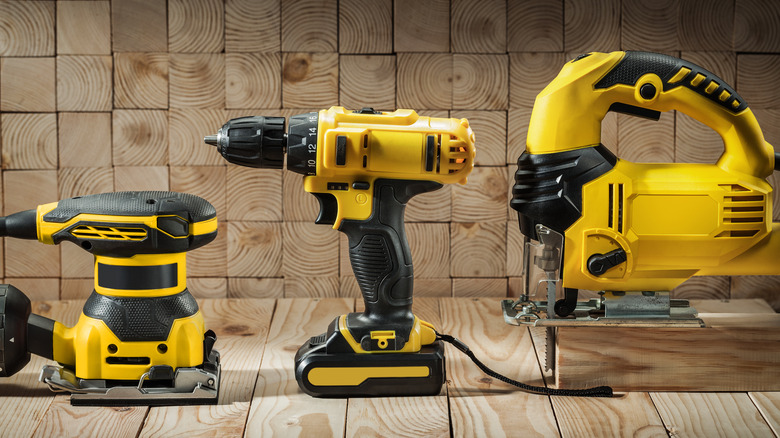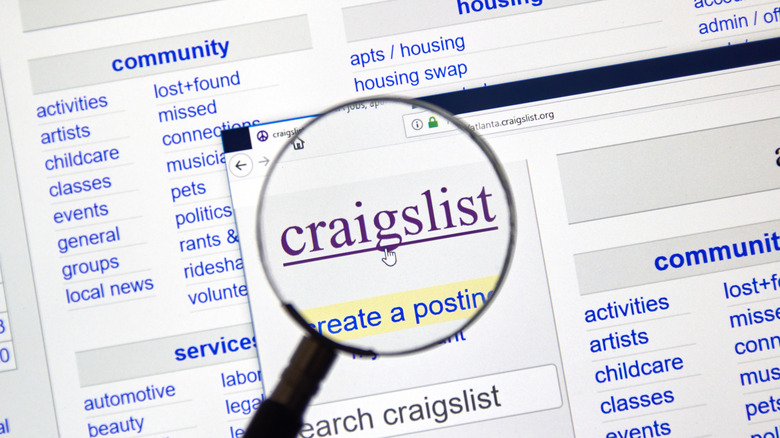5 Of The Best Places To Buy And Sell Vintage Power Tools
Maybe you're on the lookout for vintage power tools because you prefer them over their modern equivalents, or you're a collector. Maybe you have some old tools you don't want anymore and need to offload them, or it's time for an upgrade and you don't want to hang onto the older stuff. No matter the reason, if you're in the market for vintage power tools (or the market to get rid of them), it's not really something you can remedy with a trip to the nearest Home Depot or Lowe's.
Vintage power tools are out there, and there is a market for selling them, it's just that you have to know where to look. Fortunately there are a number of places where you can do either or both. These can include flea markets, yard sales, pawn shops and so on. However, availability (or interest, if you're selling) can be extremely difficult to predict so unless you're confident in your chances or don't have any other options, you're better off ignoring those avenues.
Instead, consider dealing in vintage power tools from one or more of the suggestions below. Just remember that, when buying or selling aftermarket goods, you're dealing with individuals and not a business. Meaning you'll want to be mindful of shady payment requests, dishonest listings, and other possible tricks.
Try small local hardware stores
Buying or selling vintage power tools at local hardware stores is, admittedly, not a guarantee. Whether or not any given shop partakes in aftermarket tool sales depends entirely on the business — and big chain stores are even less likely to do it.
That said, it doesn't hurt to swing by some of your local small hardware businesses and ask around. It's possible they might be open to buying your vintage power tools. And if they buy vintage tools, there's a good chance they sell them, too. Of course, just like with buying and selling used tools in the first place, the condition requirements and prices are entirely up to the store. If you manage to find two shops that deal in used tools you may find a difference in what they're asking or offering.
It's recommended that you ask about all of this at the shop before attempting to bring any tools in for possible sale, though. The simplest way to check beforehand would be to search for nearby hardware stores, then look for more details. Check their websites (if they have one), send them an email if one is listed, find the store's phone number and give them a call, or swing by in-person and ask. It may also be helpful to have photos and information on each too's' condition, because some of them might not be in the right shape for the store to accept them and you probably don't want to waste time hauling around anything you're going to have to carry back home.
Scour Craigslist
Acting as an online alternative to newspaper classified ads, Craigslist can be used to buy and sell just about anything. So of course power tools — vintage and otherwise — can be found there as well.
The thing about Craigslist is, much like those classifieds we used for comparison, buying and selling is typically done locally and in-person — though you can buy and sell outside of your local area as long as everyone agrees upon shipping and payment methods. This can limit availability (when buying) and the size of your potential pool of buyers (when selling), but it also means no paying for shipping. And if the transaction is made in cash, you don't have to worry about taxes (as a buyer or seller). Also, new listings tend to pop up quite frequently, so even if you can't find any vintage tools you want right away you may have better luck if you want another day (or week).
As with any online marketplace or equivalent service, you do need to keep a sharp eye out for scams — both when buying and selling. As a seller, you'll also want to be as thorough with your photos and listing details as possible.
Facebook Marketplace
If you're unfamiliar with or wary of Craigslist, Facebook Marketplace is a very similar service. Except it's owned and operated by one of the largest social media companies in the world.
One of the biggest differences with Facebook Marketplace is that transactions can be managed directly through Facebook, and those transactions are covered by various payment protections. In-person cash sales and transactions made through other digital means are also possible as well. And since it's part of Facebook already, it's fairly easy to check for specific items or share your sales across various relevant Facebook groups.
Facebook Marketplace arguably offers more security when compared to its much older alternative, too. Both buyers and sellers need to have a Facebook account in order to make a listing or purchase something — though you can browse around without logging in or making an account. Also, there are those previously-mentioned payment protections. It's still not a licensed retailer, though, so you'll still want to be wary of questionable listings, irregular payment practices, and other potential red flags.
Consider eBay
While it's not necessarily the way to find the best prices or earn the most money, and it has its own share of untrustworthy user behaviors to look out for, eBay is still one of the most direct ways to go about buying or selling vintage power tools (or just about anything, really), especially when it comes to online sales.
Millions of users and a plethora of item categories mean there's a good chance you'll be able to find the vintage tools you're looking for, or find someone that is looking for the tools you want to sell. And if you can't find what you're looking for, you can set up notifications so that you receive an email any time a new listing that meets your criteria is added.
The catch is that eBay's marketplace can be unpredictable, with availability and similar listings often determining how much (or how little) you'll be spending or making. As a buyer you might find what you're looking for at a great price or decide you need to look elsewhere for a better deal. As a seller you may be able to undercut other listings and still make more than you hoped or determine that what you might get from the sale isn't worth the time, effort, and eBay fees.
OfferUp
It's not as well known as eBay or Craigslist, but OfferUp is a hybrid of the two. The app allows users to buy or sell a variety of items locally, while presenting a system more akin to eBay with user accounts, in-app communication tools, and user ratings for buyers and sellers.
Search for the vintage tools you want to buy on the app, narrow down the distance if you prefer, then get in touch with the seller to decide on details like price and where to meet. You can also have the item shipped if the seller is offering to ship. As a seller, you can quickly list your vintage tools in the app and wait for potential buyers to reach out. Shipped items can be paid for in-app using a credit card or Apple Pay, but if you're dealing in-person OfferUp recommends sticking with cash.
Just like all the other marketplaces on this list, you will need to be mindful of potential scams. Don't do anything (besides in-person transactions) outside of the OfferUp app, don't deviate from official shipping or payment methods, don't use any links a user sends you, don't share your phone number or email address, read each listing carefully, and so on.





